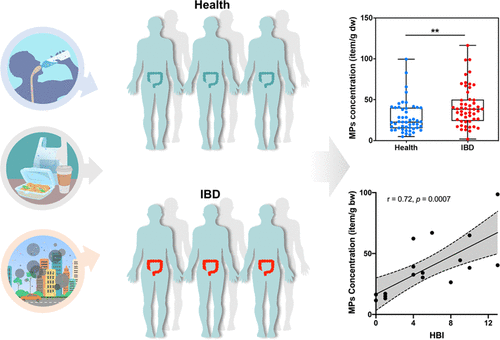Microplastic Particles Linked to IBD
/By Pat Anson, PNN Editor
Microplastics — tiny bits of plastic so small they are invisible to the naked eye --- can be found in our food, water and even the air we breathe. But research is only beginning on the prevalence and health effects of plastic particles in humans.
A 2020 study found that babies fed formula from plastic bottles swallowed millions of microplastic particles every day. And a recent review that looked at the impact of microplastics on human cells found evidence of cell death, immune response and damage to cell walls.
“We are exposed to these particles every day: we’re eating them, we’re inhaling them. And we don’t really know how they react with our bodies once they are in,” lead author Evangelos Danopoulos, a postgraduate student at Hull York Medical School in the UK told The Guardian.
For the first time, Chinese researchers have now found evidence that people with inflammatory bowel disease (IBD) have more microplastics in their feces, suggesting that plastic particles in the digestive tract could play a role in the development of Crohn’s disease and ulcerative colitis.
Researchers obtained fecal samples from 52 people with IBD and 50 healthy people from different geographic regions of China. They found that feces from the IBD patients had significantly more microplastics than the control group – an average of 41.8 particles per gram in the IBD group vs. 28 particles in healthy people. People with more severe IBD symptoms had higher levels of microplastics. Their particles also tended to be smaller.
ENVIRONMENTAL SCIENCE AND TECHNOLOGY
Researchers surveyed both groups and found that people who consumed more bottled water and takeaway food, and were often exposed to dust had more microplastics (MPs) in their feces. The two most common types of plastic found were polyethylene terephthalate (PET; used in bottles and food containers) and polyamide (PA; found in food packaging and textiles).
Still unclear is whether exposure to microplastics causes or contributes to IBD, or whether people with IBD simply accumulate more microplastics in their digestive tracts because of their disease.
“We conclude that the plastic packaging of drinking water and food and dust exposure are important sources of human exposure to MPs. Furthermore, the positive correlation between fecal MPs and IBD status suggests that MP exposure may be related to the disease process or that IBD exacerbates the retention of MPs,” researchers reported in the journal Environmental Science & Technology.
The prevalence of IBD is rising around the world. A 2015 CDC study estimated that about 3.1 million adults in the U.S. were diagnosed with IBD, nearly double the 1.8 million Americans who reported having IBD in 1999. The researchers found an association between IBD and people with lower income and education levels, but did not look into the role of microplastics.







